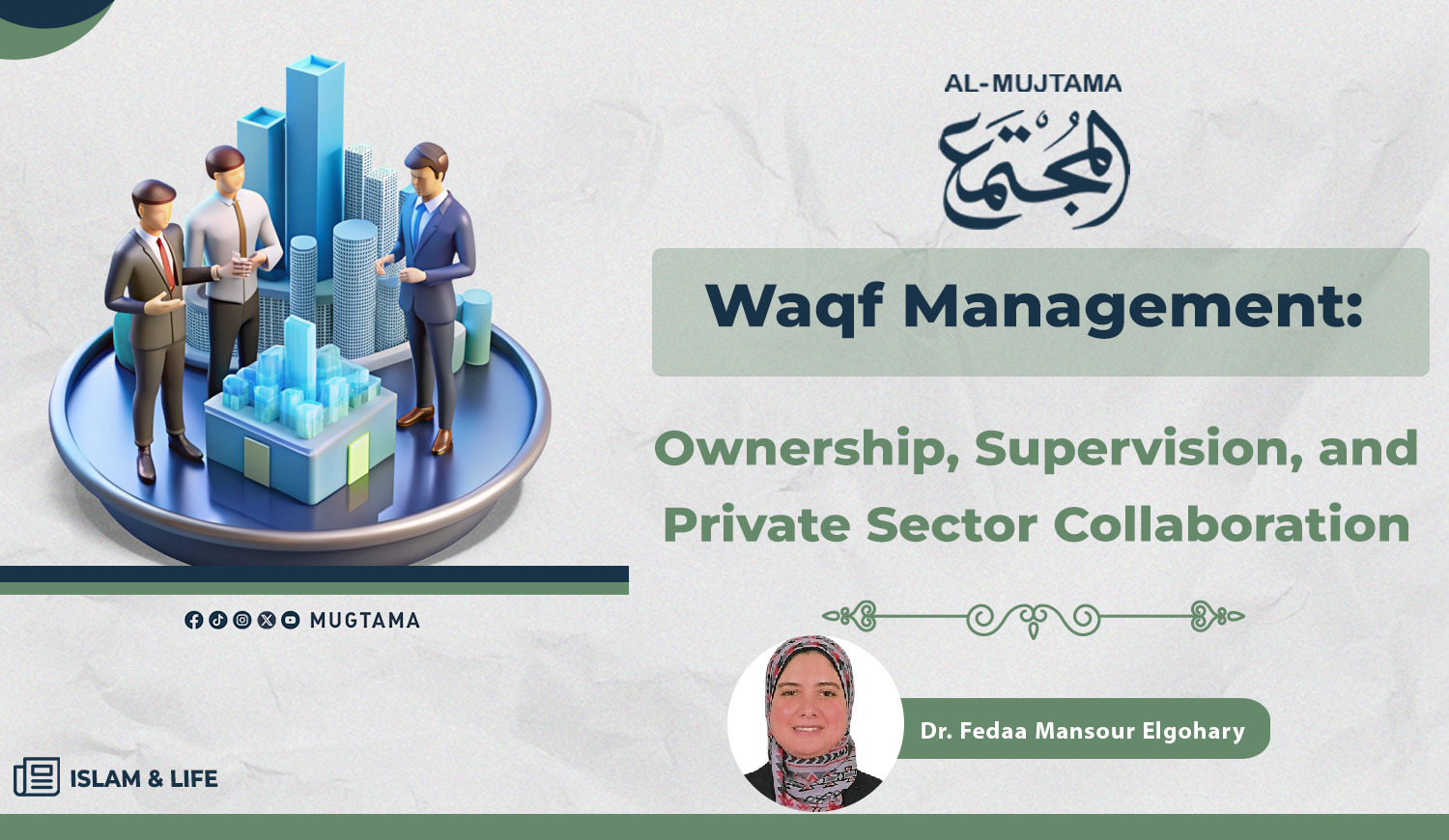Waqf: A Legacy of Giving and Sustainable Development
Waqf Management: Ownership, Supervision, and Private Sector Collaboration

Waqf, that ancient institution carefully maintained by Muslims throughout history, in compliance with the commands of the Prophet (peace be upon him) and the actions of the Companions and Successors, represents a fundamental pillar of social solidarity and sustainable development. It is, in essence, a perpetual voluntary charity, defined as "tying up the principal and dedicating the usufruct." This means allocating a specific asset (real estate, shares, money) for its income to be spent on good deeds and charity, while the principal remains tied up, not to be sold, gifted, or inherited.
However, for Waqf to achieve its
noble objectives and for its benefits to continue, sound and conscious
management becomes crucial. Who has the right to manage Waqf? And is it
permissible to transfer its ownership or management to the private sector?
Who has the right to manage Waqf?
The management of Waqf, or what is
known as "Nazarah (supervision) over Waqf," is a significant
responsibility for the continuity of the Waqf and the fulfillment of the
endower's intentions. It can be assigned to a natural person or a legal entity
(institution). Islamic jurisprudence has affirmed the necessity for Waqf
management to undertake actions that preserve the endowed property, ensuring
its survival and continuity, such as maintaining the Waqf through repair,
upkeep, and care, as well as collecting its proceeds, fulfilling the endowers'
conditions, and investing the Waqf according to the nature of the endowed
asset. The right to manage is determined based on several Sharia and legal
considerations, including:
- The Endower's Condition: Originally, the endower's condition is considered the
decisive factor in determining the supervisor of the Waqf. The endower,
who dedicates the asset, has the full right to specify who will manage
their Waqf in the Waqf document (Waqfiyyah). The majority of jurists hold
that the endower's condition is like a legislative text; it must be
adhered to unless it contradicts a clear Sharia text or the overriding
interest of the Waqf (1).
If the
endower does not appoint a specific supervisor, or if the appointed supervisor
dies and the endower did not stipulate a successor, the right of supervision
transfers to:
1.
Beneficiaries: If the Waqf is designated for specific individuals or
entities (like family Waqf), the supervision may transfer to the most suitable
descendant of the endower or the beneficiaries.
2.
The
Judge or the Competent Government Authority:
In many Islamic countries, the Ministry of Awqaf or relevant official bodies
oversee and manage charitable endowments, especially if there is no designated
supervisor or if the endower's conditions are not met. In Egypt, for example,
the Egyptian Ministry of Awqaf is responsible for managing charitable
endowments unless the endower stipulated supervision for themselves or their
children.
- Conditions for the Waqf Supervisor: To ensure good management and trustworthiness, the
Waqf supervisor must meet a set of essential conditions, most notably:
1.
Justice
and Trustworthiness: They must be reliable in their
faith and character and capable of preserving and developing the Waqf's assets.
2.
Competence: They must possess the necessary ability and experience to
manage and develop the Waqf in a way that serves its interests.
3.
Adulthood
and Sanity: They must be an adult of sound
mind.
4.
Islam: Most jurists stipulate that the Waqf supervisor must be
Muslim, especially if the Waqf is for Islamic charitable purposes, such as
mosques.
Is it permissible to transfer Waqf ownership or management to
the private sector?
This question involves an important
distinction between transferring ownership and transferring management:
- Transferring Waqf Ownership (Sale or Replacement): The ownership of the endowed property's corpus
transfers to the ownership of Allah Almighty, as some schools of thought
hold. Therefore, the endower themselves does not have the right to dispose
of the Waqf as private property, nor does the Waqf supervisor, the judge,
or any entity managing the Waqf. The principle of Waqf is to tie up the
principal and dedicate the usufruct; meaning the Waqf is not to be sold,
gifted, or inherited. This is the principle of perpetuity in Waqf and the
fundamental rule that ensures the continuity of the Waqf and its benefit
for successive generations (2).
Nevertheless,
there are very exceptional cases where it is permissible to replace the Waqf
(i.e., sell it and buy another Waqf in its place) or sell it outright in some
schools of thought, under strict conditions and after obtaining permission from
the judiciary or the competent authority. The most prominent of these cases
include (3):
1.
Cessation
of Waqf Benefits: If the Waqf is ruined or its
benefits have ceased entirely, or its returns have significantly decreased to
the extent that it no longer fulfills its intended purpose.
2.
Overriding
Interest: If replacing the Waqf leads to a
greater benefit for the Waqf and its beneficiaries, such as selling an old
property that yields no benefit and purchasing a more profitable property or
one in a better location in its place.
3.
Endower's
Condition: If the endower themselves
stipulated in their Waqf document the permissibility of selling or replacing
the Waqf when needed or for its benefit.
Based on
this, it is not permissible to transfer the ownership of Waqf to the private
sector as a purely commercial sale, except within these exceptional conditions
aimed at achieving the Waqf's own interest, not for the private sector's
specific profit. This means the objective in this case is to convert the Waqf
into another asset that better fulfills its objectives, not to remove it from
its endowment status.
- Transferring Waqf Management to the Private Sector: This issue differs from transferring ownership. It is
possible to contract with private sector entities to manage Waqf assets or
invest them in a way that achieves the Waqf's goals, develops it, and
increases the benefits and returns of the endowed property. This would be
under the supervision of the legitimate supervisor or the competent
government authority (such as the Ministry of Awqaf).
For example,
the Awqaf Authority can contract with specialized companies in real estate
management or investment to develop Waqf assets. However, the ultimate authority
and supervision of the Waqf remain with the official entity or the legitimate
supervisor; the ownership of the Waqf or the absolute right to dispose of it
does not transfer to the private sector.
The
goal of involving the private sector in management and investment is to:
1.
Improve
Management Efficiency: Benefit
from specialized expertise in asset management and development.
2.
Develop
Waqf Funds: Maximize the utilization of Waqf
assets to increase their income and expand the scope of their beneficiaries.
3.
Overcome
Challenges: Address problems that traditional
Waqf management might face (such as lack of expertise or limited resources).
However,
this must be done with strict controls that ensure:
4.
Preservation
of the Waqf Principal: Not to
misuse it or exploit it for personal gain.
5.
Fulfillment
of the Endower's Intentions:
That the management aligns with the conditions set by the endower and the
purpose for which the asset was endowed.
6.
Transparency
and Accountability: Governance of the Waqf institution
through continuous oversight by the competent authority over the private
sector's performance, and the publication of clear information about the Waqf
institution's goals and how it is managed (4).
To maximize the benefit from these
partnerships and enhance the self-capacity for Waqf management and investment,
and to protect Waqf funds from mingling with public or private funds, it is
proposed that ministries and official bodies supervising Waqf include experts
in Islamic economics and accountants specializing in Islamic finance. Such
combined expertise would ensure effective Waqf management, achieving
sustainable development of its assets, and ensuring the fulfillment of its
legitimate objectives with high professionalism and complete transparency.
Waqf is an institution characterized
by its unique nature and its Sharia and legal rulings aimed at the continuity
of charitable benefit. Its management is a great responsibility that rests with
the legitimate supervisor or the competent authority, with the possibility of
seeking assistance from the private sector in aspects of management and
investment under strict controls. The ultimate goal is to ensure the continuity
of the Waqf and to maximize its benefit in serving society and achieving the
noble intentions of the endower.
Therefore, it is of paramount
importance that any dealings with Waqf, whether in its ownership or management,
observe this uniqueness and serve the interest of the Waqf and its
beneficiaries to ensure the achievement of these objectives.
========
(1)
محمد محمود الجمال. (د. ت)، إدارة واستثمار أموال الوقف في الفقه الإسلامي وأنظمة
الإدارة العامة للأوقاف القطرية، مطبوعات الإدارة العامة للأوقاف القطرية، ص 2.
(2)
محمود أبو زهرة (1971)، محاضرات في الوقف، دار الفكر العربي، القاهرة، الطبعة
الثانية، 1391هـ، ص 39.
(3)
العيّاشي الصادق فدّاد (2008)، مسائل في فقه الوقف، المعهد الإسلامي للبحوث
والتدريب- البنك الإسلامي للتنمية، دورة دور الوقف في مكافحة الفقر، نواكشوط 16-18
مارس 2008، ص 25-27.
(4)
أمين عويسي (2024)، تحسين أداء إدارة الوقف من خلال المقاربة بين قواعد الحوكمة
وشروط الواقف دروس مستخلصة من نماذج لمؤسسات وقفية معاصرة، الأمانة العامة للأوقاف
بدولة الكويت، منتدى قضايا الوقف الفقهية الحادي عشر، في الفترة من 11-13 نوفمبر
2024، ص10.











